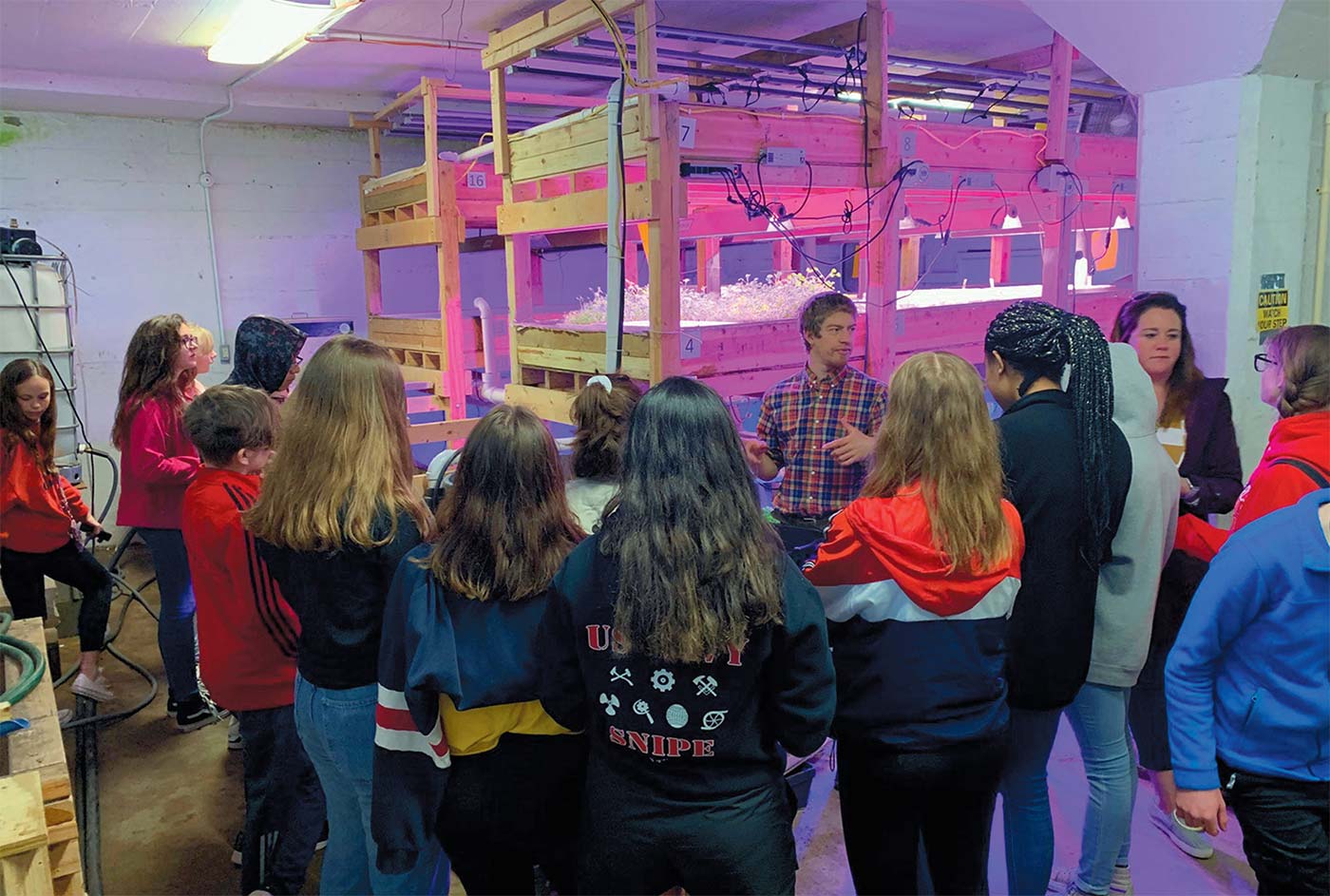Former Armory Takes Aim Boosting Ag Sustainability
The Farmory is housed in a former armory at 815 Chicago St. in Green Bay. For decades after the building opened near the end of World War I until the 1960s the armory served as a training site and weapons depot for the 32nd Red Arrow Division of the National Guard – hardly the place, it would seem, for a centerpiece to the area’s agriculture-sustainability movement.
After sitting vacant for nearly 40 years, the armory has become home to a nonprofit group that is a self-sustaining, year-round indoor agriculture center. The Farmory is partnering with Northeast Wisconsin Technical College (NWTC), University of Wisconsin-Green Bay, The Medical College of Wisconsin at St. Norbert College in De Pere, E-Hub’s Urban Hope Entrepreneur Center, NeighborWorks Green Bay, Forward Service Corporation, the Volunteer Center of Brown County and Wello.
A major part of its mission is to build community by offering seminars in a wide variety of subjects designed to teach people how to grow and preserve wholesome food for their families and to partner with education institutions including a project at West De Pere High School and the Medical College of Wisconsin through the University of Wisconsin-Green Bay.
“The Farmory started as a community-building effort, working with local residents to build their awareness of the importance of the local food system, of eating well, being nutritious and bringing the concepts of sustainable agriculture to folks that live in town,” Executive Director Claire Thompson said. “We’re located in a food desert where there are no other sources of groceries within about a mile of where we’re located. That was also part of the inspiration for our project that we would help people grow or procure locally grown nutritious food. So all of our seminars have that food theme: how to grow it yourself or how to find it from other local growers.”
One goal is to get past the misconception that healthy food is boring.
Thompson said local producers provide a wide variety of food and locally produced fruits and vegetables are more nutritious than those that have been transported from a great distance.
“Simply having foods that were picked literally within days of when they’re consumed makes a huge difference in the nutritional impact,” she said. Thompson said consumers are also growing more aware of how meat animals are raised which also affects nutrition.
The Farmory’s goal is to offer between 10 and 20 workshops a year. Most are held at the start of the growing season and at harvest time. One of the most popular workshops this year dealt with mushroom cultivation.
“You don’t need a lot of space to cultivate mushrooms,” she said. “Mushrooms are extraordinarily rich in nutrients and health benefits.”
Another popular seminar showed people how to raise chickens in the back yard. Residents can produce enough eggs to feed the family right at home at a very low cost. In devising a schedule, Thompson said they look for topics and well-qualified instructors to serve as presenters. She said they also rely on surveys from past attendees so they are responding to their reactions and suggestions.
They rely on their education committee made up of representatives from schools, libraries and other community-based organizations that develop the schedule. More than 400 people attended Farmory workshops last year, and more than 100 tours were conducted.
“Our community model is working to get people involved in the food system,” Thompson added. “We’re also unique because we are endeavoring to have a completely self-sufficient commercial-scale vertical farm with profits benefitting our social mission. We are implementing operational efficiencies so that we can be a profitable enterprise and sell our product on the wholesale market. We’re not competing against the local farmer; we’re working to increase the share of locally grown food available to institutional markets.”
The Farmory currently sells greens to Black and Tan and The Cannery restaurants in Green Bay with any surplus going to food pantries.
“Simply having foods that were picked literally within days of when they’re consumed makes a huge difference in the nutritional impact.” – Claire Thompson
Volunteers remain a major factor in the Farmory’s current operation. One of their key volunteers is Patty Casady, a VISTA Ameri- Corps volunteer.
“I attended a workshop at the Farmory while working at The Bridge CSA in Denmark, then began volunteering one day per week, then more days and ended up at West De Pere High School,” Casady said. “I love it! I came in here knowing nothing; I knew how to grow a plant but I didn’t know how to grow a plant in water. It turned out to be easy. I love our mission and what we’re doing – providing clean, healthy food to families that live in a food desert.”
When students at West De Pere High School eat salad for lunch in the cafeteria, the greens for those salads were grown right at the school as the school is the site of one of the Farmory’s aquaponics projects. The nutrient- rich water from the fish tanks is then used to grow greens; then the water is recirculated back to the fish tanks.
At West De Pere, planters of baby greens float on water in large tanks. “I clean the filters, I feed the fish and check on their growth,” lead student volunteer sophomore Brandon Stevens explained. “For the plants I refill the new beds. Every Monday, I make sure the fish are OK by checking the pH, ammonia, nitrate and nitrites.”
The operation currently is growing several varieties of greens including kale and amaranth, a red-hued green; and amara, a member of the mustard family.
Stevens has been interested in hydroponics since eighth grade, then as a freshman became involved with the Farmory. He attended a workshop on the subject and asked if he could volunteer. Now he not only leads the West De Pere program, he is developing an aquaponics club to take over the operation when he graduates and begins training for an aquaponics career.
At the University of Wisconsin-Green Bay, nutrition associate professor Deb Pearson has been involved with the Farmory since shortly after it opened when the then-executive director conducted a daylong workshop at UWGB. "The Farmory, a place which is hoping to develop a local, sustainable source for fish and edible greens; and along the way, helping to educate people about where food comes from, about being more sustainable and making healthy food choices,” she said.
Pearson got involved with the Farmory’s education committee. “I see it as such a ‘win-win’ for our college students who need to put their academic knowledge to the test; to apply it to real-world situations potentially doing internships to learn about these urban ways of growing food. The Farmory needs expertise, while our students can volunteer, gain experience, hone their academic knowledge into real-life skills.”
Pearson said the Farmory’s education component has several key components. First, reaching out and partnering with area school districts with grade-appropriate programs.
“They could be where some of us go into the schoolroom or teachers bring a group of kids to the Farmory for a field trip,” Pearson said. Secondly, the Farmory is extending knowledge to the community at large. “We can tap college students to run these programs to develop skills and help the Farmory in its next steps.”
A unique aspect of the Farmory’s partnership with UWGB is the teaching of nutrition to students from the Medical College of Medicine program housed at St. Norbert College in De Pere.
Thompson sees this as a unique aspect of the Farmory.
“This is great for them because they aren’t going to school to be teachers; they’re going to school to be doctors. They’re getting hands-on experience in communicating about health and nutrition to youth, while the youth are getting high quality experiences here at The Farmory,” Thompson explained.
The Farmory continues to develop and grow in the city and reach out to the public in a host of ways.
Some upcoming seminars include: Backyard Beekeeping, Jan. 23, 2020, 5:30 p.m.; Grass Finished Meats, Feb. 5, 6 p.m.; and Backyard Mushrooms, Feb. 27, 6 p.m.





